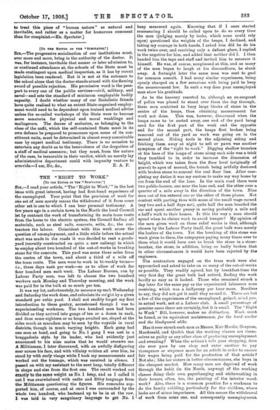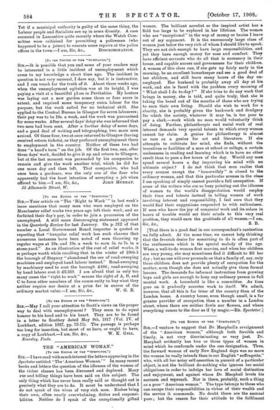THE "RIGHT TO WORK."
[TO TR! EDITOR OF THE " gPSMATOP..1
read your article, "The Right to Work,'" in the last issue with great interest, having had first-hand experience of the unemployed. Your point that the provision of work for one set of men merely means the withdrawal of it from sonic other set is one to which I can bear personal testimony. A few years ago in a certain town in the North the local Council let by contract the work of transforming its main tram route from the horse to the electric system, the Council finding all materials, such as steel rails, concrete, setts, &c., the con- tractors the labour. Coincident with this work arose the question of unemployment, and a little while before the actual start was made in the roads it was decided to rent a goods- yard (recently constructed on quite a new railway) in which to employ about two hundred of the out-of-works in breaking stone for the concrete. This yard was some three miles from the centre of the town, and about a third of a mile off the tram route. The men were to work in bi-weekly turns- i.e., three days each per week—so as to allow of work for four hundred men each week. The Labour Bureau, run by Labour Party men, was left to choose the two hundred workers each Monday and Thursday morning, and the work was paid for in the bulk at so much per ton.
It was my lot, unfortunately, to measure up each Wednesday and Saturday the work done, and calculate its weight by a given standard per cubic yard. I shall not readily forget my first introduction to these gentry, accustomed though I was to superintending workmen: The two hundred men had been divided as they arrived into gangs of ten or a dozen in each, and thus some eighteen or so heaps awaited me, sloped at the sides much as macadam may be seen by the wayside in rural districts, though in much varying heights. Each gang had one man as head, and going to No. 1 gang I was met in a braggadocio style by its leader, who had evidently just announced to his nine mates that he would oVerawe me. A Militiaman, I later discovered, with an awfully disfiguring sear across his face, and with villainy written all over him, he stood by with surly visage while I took my measurements and ivorked out the tonnage, which was received in silence. I passed on with my assistant to the next heap, totally different In shape and size from the first one. The result worked out Maly to the smile weight as No. 1 hp, and as I called it out I was overwhelmed with oaths and filthy language from the Militiaman questioning the figures. His comrades sup- ported him, of course, and at once I was surrounded by the Whole two hundred, who hastened up to be in at the row. I. was told in very sanguinary language to get No. 1
heap measured again. Knowing that if I once started remeasuring I should be called upon to do so every time the men (judging merely by looks, which none could rely upon) questioned the weights of the heaps, I declined, and taking my courage in both hands, I asked him did he do his work twice over, and receiving only a defiant glare, I replied in the negative for him, and added that neither did I. I then handed him the tape and staff and invited him to measure it himself. He was, of course, nonplussed at this, and as many of the men began to laugh at his discomfiture, be slunk away. A fortnight later the same man was sent to gaol for common assault. I had many similar experiences, being openly charged on a few occasions with being paid to keep the measurement low. In such a way does your unemployed man show his gratitude.
As to the knavery resorted to, although an ex-sergeant of police was placed to stand over them the day through, these men contrived to bury large blocks of stone in the centre of the heaps, thus obtaining measurement for work not done. This was, however, discovered when the heaps came to be carted away, one end of the yard being used for the first part of the week and the opposite end for the second part, the heaps first broken being removed out of the yard as work was going on in the second place. Hiding tools in the adjoining siding and fetching them away at night to sell or pawn was another symptom of the "right to work." Digging shallow trenches at the base of the heaps of stone along each side was a trick they tumbled to in order to increase the dimension of height, which was taken from the floor level (originally of gravel) to apex of mound, the trench being artfully doctored with broken atone to conceal the real floor line. After com- pleting my duties it was my custom to make my way home by car from the end of the lane. In the main road there were two public-houses, one near the lane end, and the other over a quarter of a mile away in the direction of the town. Nine men out of ten entered one or the other of these places. Not content with parting thus with some of the small wage earned (say two and a half days net), quite half the men boarded the car and spent another penny in saving probably a mile and a half's walk to their homes. Is this the way a man should spend when he claims work to avoid hunger? My opinion of the men given work on those relief works is that, although chosen by the Labour Party itself, the great bulk were merely the loafers of the town. Yet the breaking of this stone was work given to them, the ratepayers paying many times over to them what it would have cost to break the stone in a stone, breaker, the stone, in addition, being . so badly broken that in other circumstances it would have been rejected by the engineers.
The contractors engaged on the tram work were also approached and asked to take on as many of the out-of-works as possible. They readily agreed, but by breakfast-time the very first day the great bulk had retired, finding the work hardly so easy as it looked. Those who remained struck a day later for the same pay as the experienced labourers were receiving, which was a halfpenny per hour more. Needless to say, they did not get it until they ea rned it. These are but a few of the experiences of the unemployed, gained, mind you, in actual work, not at a Labour club. A small percentage of genuine cases there are certainly, but it is small. The " Right to Work" Bill, however, makes no distinction. Work must be found, or its equivalent maintenance, for the hard worker and the blackguard alike.
Has it ever struck such men as Messrs. Keir Hardie, Grayson, Macdonald, and Quelch that the working classes are them- selves as guilty as any other class of producing unemployment and sweating? When the artisan's wife goes shopping, does she ever pass by one shop and enter another to pay threepence or sixpence more for an article in order to ensure fair wages being paid for the production of that article ? Not she ; like her sisters in better circumstances, she buys in the cheapest market. How many men are deprived of work through the habit (in the North, anyway) of the working classes doing their own paperhanging and whitewashing in their houses, often, too, the painting of the interior wood- work ? Also, there is a common practice for a workman to do the family cobbling, particularly for the children, where looks are of minor importance. All this means the withdrawal of work from some one, and consequently unemployment.
Yet if a municipal authority is guilty of the same thing, the Labour people and Socialists are up in arms directly. A case occurred in Lancashire quite recently where the Watch Com- mittee were criticised for permitting a policeman (who happened to be a joiner) to execute some repairs at the police
offices in the town.—I am, Sir, &c., DISCRIMINATION.















































 Previous page
Previous page